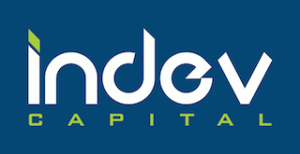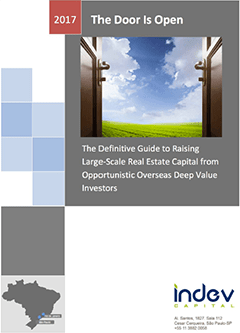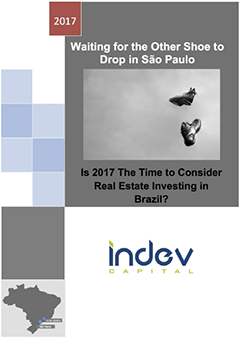
The objective of this newsletter is to provide a perspective for global real estate investors about Brazil real estate investment opportunities after what appears to be a likely impeachment and an official change in the political spectrum in Brazil. Based on the complexity of this topic, this newsletter has two Brazilian co-authors: Ricardo Carvalho, a partner at InDev Capital, and Raphael Castro, a structured finance expert here in Sao Paulo.
Jan 1, 2015 – April 17, 2016 (Impeachment Vote)
2015 and the first quarter of 2016 were scary times here in Sao Paulo. In small gatherings and coffee shops, the dominant theme of the conversation among business people was who had lost more money, which company was in worse shape, how the current (Dilma at the time) administration was horrible, and how a friend was considering leaving Brazil etc. Even among the expat community, there were going away parties almost every week. It almost got to the point that I thought I may become the only American left. As they say in that great state of North Carolina, “Times were hard!”.

This was the mood of the nation in 2015 and the first quarter of 2016… not pretty.
Politics in Brazil
Properly understanding Brazilian politics and laws can be tricky. Very tricky. Many Brazilians themselves either do not understand them or, more likely the case, have given up trying to understand them altogether, due to the complex nuances, behind the scenes activity, and sadly more-frequent-than-desired corruption.
Brazilian politics reminds me of a specific dorm room of a close college friend of mine. As it is a small world, let’s call him “John.” John lived in the same room for three or four years. To put it mildly, he never cleaned his room for the time we were together at Stanford. John was the Resident Assistant and worked in Silicon Valley during the summers, so it was his literal home to do as he desired. His room was likely one of the least habitable environments in California, probably in the USA, and perhaps in the top ten least habitable places globally. At graduation, John decided that the room was simply too difficult to clean up. John graduated, put on a t-shirt, shorts and flip-flops and drove his VW beetle home to Los Angeles. Like John’s room, many Brazilians believe politics in Brazil is too hard, complex, and dirty to understand.

The dorm on Stanford’s campus where “John” lived for four years. I’m quite certain that Stanford University has cleaned “John’s room” and I am sure the poor soul that was assigned to clean the room was extremely upset.
Back to Politics
Back to Brazil and Dilma… Along with being wrong with several economic matters and not listening to her advisors, Ms. Rousseff simply could not build relationships with the Brazilian Congress. This inability was coupled with the end of the commodity super cycle that had covered up a lot of problems (in business and government, revenue can cover up a lot of problems!)
Dilma’s government’s belief that they could pick winners in various industries caused significant instability and excess capital in some sectors that invested poorly and no capital in other sectors that could have made successful investments. Huge public capital injections for “selected” deals – such as OGX, Petrobras, JBS, Oi and Sete Brasil (combined BNDES exposure north of at least R$ 40 billion, to put it very lightly: Odebrecht alone, with a total outstanding debt of US$ 110 billion, has gotten US$ 31.7 billion just from the Brazilian National Development Bank, the BNDES – yes, nosebleed figures…) – were similar to trying to put out a fire with gallons of premium gas, and expecting a different result. It got ugly.
The Brazilian economy had been going to “hell in a handbasket” since early 2015, deeply contrasting (and we mean DEEPLY) with Ms. Rousseff’s campaign debates and promises. The anger level within months after Dilma’s October 2014 election victory, even among her election-day supporters, was severe. Brazil’s government’s financial resources could not be stretched into infinity to maintain programs such as Minha Casa Minha Vida (low income housing, author’s opinion legitimate), and Bolsa Familia (a controversial program to provide food for lower income people to keep their children in school, author’s opinion legitimate), AND the rampant number of public employees (absurd, I too am a taxpayer here in Brazil), AND the Brazilian public social security net (out of control for a country at the GDP per capita level of Brazil), AND Petrobras (beyond absurd), AND the BNDES (what word is beyond “beyond absurd” – perhaps ÜBER beyond absurd?!?!?), AND the wage corrections to public employees… it was not going to end well.
So the question remains, where are we now? Is a new cycle starting? Is it a fake start? Where is Brazil in the real estate cycle versus the USA? These are all important questions.
Post Impeachment
Well, as all readers know, the impeachment process of the Dilma administration was approved by the Brazilian Congress. It is beyond the scope or role of this newsletter to discuss the process, the people involved in the impeachment, the various Swiss bank accounts, or the leader of the impeachment process, Mr. Eduardo Cunha’s moral standing as an upright citizen.
However, what we can say is that the impeachment was an extremely important event for readers of this newsletter. As the “full impeachment vote” takes its course in August, InDev thought it would make sense to provide a perspective for real estate investors with regards to the following: one, what are the likely events to occur; two, their timing; three, their impact on Brazil real estate investment strategy.

When the economy improves, sophisticated coffee shops like this get popular. First sign that something is stirring!
Recently over coffee at a very good and slightly pricey coffee bar called Coffee Lab, I was with my business partner Ricardo Carvalho and his business savvy and super sharp friend Raphael Castro, who is a structured finance warrior here in Sao Paulo.
The conversation between Ricardo and Raphael was interesting and much of the rest of the newsletter is based upon the takeaways from that conversation. First, it was amazing how different the conversation was than those one heard just two months ago (for example, the conversations upon which we started this newsletter). Both Ricardo and Raphael were focused on what opportunities exist currently that may close when the economy improves, how to take advantage of temporary cheap pricing of various assets, and how to get ready for the next election. There was… well, optimism in the air.
I asked Raphael, “what specific factual reasons for relative optimism exist?” The discussion then turned to the interim Temer administration. Here are some of the accomplishments he stated and a summary of our conversation.
Temer Administration Accomplishments in the past 80 days:
- Putting together a credible economic team to help boost confidence in Brazil
- Reestablishing a “healthy” relationship with the Brazilian Congress
- Clarity in regards to the need for austerity in Brazil’s public administration
- Open-handed about the country’s current situation
- Signaling the need to foster an investor-friendly environment for Brazilian infrastructure projects
Although these changes do not seem very significant, it is hard to overstate the impact they have had on the mindset of many Brazilian business people. In general, Brazil is a more emotive society than the US or most parts of Europe (with the likely exceptions of Italy, Spain, Portugal, and Greece). The emotion of many top-tier business executives has already shifted from passive to active.
To assist our readers, here is a matrix of the Temer Administration’s goals according to our conversation and also from a business magazine called Istoe Dinheiro.
Investor CheckList to Monitor Progress of Temer Administration

Before the Temer administration, the objectives listed above were dealt with in a “State-Driven” fashion rather than a “Free Market” orientation. This is not to say that the new administration’s leader, Mr. Temer, is a huge fan of the late Austrian economist Friedrich Hayek or the late great giant American Milton Friedman. In addition, Temer is not a principled economic conservative as, say, a Paul Ryan (current US Speaker of the House) or the late great Jack Kemp (former US congressman), with strong beliefs based on a long-standing track record and consistent policies. However, and importantly, Temer is practical, a survivor, and realizes in his core that the above listed objectives are needed urgently.
Temer and his economic team are clearly aware that there is little to no room for error at this stage of Brazil’s recession. Importantly, the economic team has been very open-handed about the need to open up to other sources of (private) funding, especially international ones, which translates into promoting a friendly business environment to investors worldwide.
Temer’s desire not to run for President again is also a benefit of this administration. The economic issues will likely move faster than the social issues (labor laws, pension reform), although the latter are essential in the medium to long term, as well.
Thoughts to Consider over the next 30 to 45 days
1) Finalization of President Dilma’s Impeachment process. High probability Temer becomes the new President which removes significant uncertainty.
2) Based on a new Speaker of the House (in Portuguese called Presidente da Camara), Temer’s overall power in Congress has increased. Post impeachment, this new influence can result in stronger changes than expected.
3) Temer, if nothing else, is a politician. He possesses a proven ability to build bridges in Congress. Dilma had no experience in this area and this is one of the issues that led to her challenges and eventual impeachment.
4) The business community has effectively told Temer that he has until November to show significant improvement to maintain their full support. Temer is aware that if by November actions are not taken to justify businesses’ support, he will lose momentum.
5) Upon an impeachment, a new election is legally not feasible and therefore Temer’s strength is greatly enhanced. His mandate is not as strong as if he were elected but significantly stronger than his current situation.
6) Long-term structural changes on labor law and social security are on the table but may be difficult without an election. Perhaps small moves can be made in those areas. This is a wildcard and, while not impossible, may take more time and require an elected president in 2018 with a natural and full mandate.
So what does this mean for our newsletter reader? Why do I care? Real Estate Market Environment Post Impeachment
The real estate market will take longer than the equity markets to react to a new environment. However, if interest rates start to move in a lower direction, there will be a firming of pricing and “distressed” and “significantly below replacement value” investment opportunities will become much more limited. The window will be open, perhaps, but will start to close gradually for those types of opportunities. In particular, the capitalization rates (commercial or industrial acquisitions) and the yield to costs (build-to-suit development) will start to compress if Temer is successful in the actions in the chart earlier. This will likely happen gradually but admittedly could happen faster than we expect. Remember, Brazil is much more emotive than the USA.
InDev Capital very much believes that there are specific real estate strategies to pursue during this time in the cycle. These opportunities still have attractive pricing and have a chance for large rewards based on the likely changes in Brazil while at the same time have significant downside protection based on purchases and investments below replacement value and existing cash flow.
Commercial Real Estate
We believe that class A commercial real estate in Sao Paulo has a unique window in what we prefer to call islands of prosperity. InDev has active transactions in the space and we will soon publish a newsletter that details the market opportunity that we think investors may find unique: “Islands of Prosperity.”
InDev published a quick thought piece on the commercial sector in 2015 when Blackstone did its initial acquisition of BR Properties portfolio (2015 newsletter). We also wrote about a niche strategy involving commercial floors in April of 2016 (2016 Commercial Floors Newsletter). In August, we will publish a commercial properties “Islands of Prosperity” newsletter to outline some key themes for investors to execute in late 2016, perhaps the late 7th or 8th inning (US baseball analogy for non-US-based readers) for value-oriented investors.
In addition, for select qualified investors, we will offer a detailed white paper about the commercial opportunity in Sao Paulo with more detailed market data and specific strategies and investment opportunities.
Build to Suit and Sale LeaseBack
InDev also believes that the Build to Suit and Sale Leaseback space has unique opportunities. This unique window is based on the “weight of time” that high interest rates have caused for property owners of industrial real estate. In addition, many corporations need to move forward on their business plans but desire to maintain their liquidity. We have active transactions in both the sale leaseback and built-to-suit sectors.
InDev recently published an introduction to the Build to Suit and Sale Leaseback newsletter. This month in our upcoming newsletter, expect us to dive deeper in the sector. In particular, we will spend more time on the debt instruments of Brazil and how this sector has the potential of accretive leverage.
In addition, for select qualified investors we will offer a detailed white paper about the BTS Sale Leaseback opportunity with more detailed market data and specific strategies and investment opportunities.
The next 30 to 45 days will be exciting times, so stay tuned. Before leaving, I want to thank my co-author Raphael Castro and my business partner Ricardo Carvalho for their contribution to this newsletter that discussed politics in Brazil. Until the next newsletter!
Joseph W. Williams.
CEO & Founder InDev Capital




